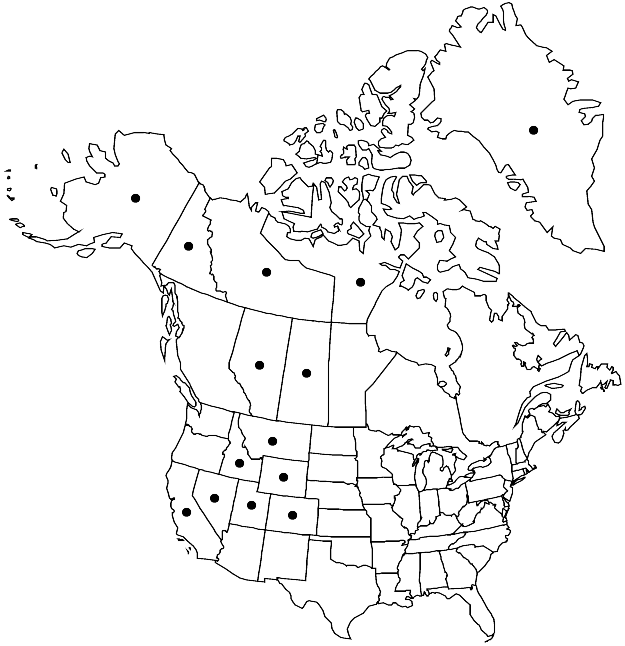Difference between revisions of "Transberingia bursifolia"
Novon 13: 396. 2003.
FNA>Volume Importer |
imported>Volume Importer |
||
| Line 33: | Line 33: | ||
-->{{Treatment/Body | -->{{Treatment/Body | ||
| − | |distribution= | + | |distribution=Alta.;N.W.T.;Nunavut;Sask.;Yukon;Alaska;Calif.;Colo.;Idaho;Mont.;Nev.;Utah;Wyo.;e Asia (Russian Far East). |
|discussion=<p>Subspecies 2 (2 in the flora).</p><!-- | |discussion=<p>Subspecies 2 (2 in the flora).</p><!-- | ||
--><p>R. C. Rollins (1993) treated subspp. bursifolia and virgata as distinct species of <i>Halimolobos</i>, but the alleged differences (stems branched basally versus distally, plants cespitose versus non-cespitose, fruits slightly compressed versus terete) do not hold, and the only reliable difference between the two taxa is in the type of trichomes. Therefore, a subspecific, rather than specific, rank is adopted here.</p> | --><p>R. C. Rollins (1993) treated subspp. bursifolia and virgata as distinct species of <i>Halimolobos</i>, but the alleged differences (stems branched basally versus distally, plants cespitose versus non-cespitose, fruits slightly compressed versus terete) do not hold, and the only reliable difference between the two taxa is in the type of trichomes. Therefore, a subspecific, rather than specific, rank is adopted here.</p> | ||
| Line 64: | Line 64: | ||
|basionyms=Nasturtium bursifolium | |basionyms=Nasturtium bursifolium | ||
|family=Brassicaceae | |family=Brassicaceae | ||
| − | |distribution= | + | |distribution=Alta.;N.W.T.;Nunavut;Sask.;Yukon;Alaska;Calif.;Colo.;Idaho;Mont.;Nev.;Utah;Wyo.;e Asia (Russian Far East). |
|reference=None | |reference=None | ||
|publication title=Novon | |publication title=Novon | ||
|publication year=2003 | |publication year=2003 | ||
|special status= | |special status= | ||
| − | |source xml=https:// | + | |source xml=https://bibilujan@bitbucket.org/aafc-mbb/fna-data-curation.git/src/bb6b7e3a7de7d3b7888a1ad48c7fd8f5c722d8d6/coarse_grained_fna_xml/V7/V7_696.xml |
|tribe=Brassicaceae tribe Camelineae | |tribe=Brassicaceae tribe Camelineae | ||
|genus=Transberingia | |genus=Transberingia | ||
Revision as of 23:59, 27 May 2020
Plants densely hirsute basally, trichomes primarily simple, to 1 mm, these often mixed with smaller, forked, and/or dendritic ones, glabrescent or sparsely pubescent distally. Stems simple or few to several from caudex, (0.5–)1–4.5(–6.5) dm. Basal leaves: petiole 0.3–3 cm, flattened at base, ciliate; blade oblanceolate to obovate, or linear-lanceolate, (0.5–)1.2–6.5(–10) cm × (2–)3–8(–17) mm, base cuneate to attenuate, apex obtuse to subacute, surfaces pubescent, trichomes usually branched. Cauline leaves: blade lanceolate to linear-lanceolate or oblong, (0.5–)1–3(–4.2) cm × (1–)2.5–7(–10) mm, base strongly sagittate. Fruiting pedicels not appressed to rachis, straight, (3–)5–14(–18) mm, glabrous. Flowers: sepals 1.2–2.5 × 0.6–1 mm, sparsely to densely pubescent; petals (2.5–)3–4(–4.5) × (0.8–)1–1.5 mm; filaments 2–2.5 mm; anthers 0.4–0.5 mm. Fruits (1.5–)2–3.3(–4) cm × (0.7–)1–1.5(–2) mm; style slender, 0.2–0.8(–1) mm. Seeds 0.8–1 × 0.4–0.5 mm.
Distribution

Alta., N.W.T., Nunavut, Sask., Yukon, Alaska, Calif., Colo., Idaho, Mont., Nev., Utah, Wyo., e Asia (Russian Far East).
Discussion
Subspecies 2 (2 in the flora).
R. C. Rollins (1993) treated subspp. bursifolia and virgata as distinct species of Halimolobos, but the alleged differences (stems branched basally versus distally, plants cespitose versus non-cespitose, fruits slightly compressed versus terete) do not hold, and the only reliable difference between the two taxa is in the type of trichomes. Therefore, a subspecific, rather than specific, rank is adopted here.
Selected References
None.
Key
| 1 | Plants glabrous or sparsely pubescent on stems distally and on rachises, trichomes simple, spreading. | Transberingia bursifolia subsp. bursifolia |
| 1 | Plants usually pubescent, rarely glabrescent, on stems distally and on rachises, trichomes branched, subappressed, these sometimes mixed with simple ones. | Transberingia bursifolia subsp. virgata |
